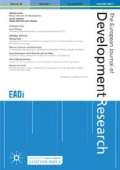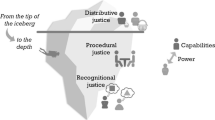Abstract
While there is an impressive amount of research – theoretical propositions as well as empirical results – focusing on how ecosystem services can contribute to poverty reduction and resilience, it is less clear how this knowledge is operationalized and applied among development agencies and development practitioners. This article investigates this by using the Swedish International Development Agency, Sida, as an illustrative case study comparing how the link between ecosystem services and poverty reduction is conceptualized at different levels within the organization, and also the extent to which those conceptualizations correspond to an ‘ideal’ conceptualization, that is, using the global Millennium Ecosystem Assessment as a baseline. The results indicate that ecosystem services first and foremost are perceived as a crucial input for economic development, but linkages between ecosystems and issues of security, health and empowerment are to some extent also recognised.
Bien qu’une quantité impressionnante de recherches – apportant des propositions théoriques ainsi que des résultats empiriques – aient été menées sur la manière dont les services écosystémiques peuvent contribuer à réduire la pauvreté et renforcer la résilience des populations, la manière dont ces connaissances sont rendues opérationnelles et sont appliquées par les agences et praticiens du développement est moins claire. Nous examinons cette question sur la base du cas de l′Agence Suédoise du Développement International (SIDA) qui illustre comment est conceptualisé, aux différents niveaux de l′organisation, le lien entre les services écosystémiques et la réduction de la pauvreté. Nous évaluons dans quelle mesure ces conceptualisations correspondent à une conceptualisation ‘idéale’, en référence au programme mondial d′ Évaluation des Écosystèmes pour le Millénaire. Les résultats indiquent que les services écosystémiques sont d′abord et avant tout perçus comme un facteur essentiel au développement économique, mais les liens entre les écosystèmes et la sécurité, la santé, et l′autonomisation sont dans une certaine mesure également reconnus.
Similar content being viewed by others
Notes
The use of the MEA as an ‘ideal’ conceptualization does not mean that the MEA conceptualization is considered to be ideal in any true sense. Of course, the MEA's conceptualization of the linkages between ecosystem services and poverty reduction is subject to ongoing critical scrutiny and debate, but its enormous impact on the policy debate still makes it suitable as a baseline and point of reference and comparison.
This assumption might, however, need some qualification, as like-minded donors such as DFID, Danida and Norad certainly can be argued to be as much forerunners on these issues as Sida. Nevertheless, it is clear that Sida belongs to this relatively small group of donor agencies giving issues of environment and development top priority.
In total, 15 elite interviews were conducted with respondents working at different levels within the organization, and with different issues. The respondents are anonymous. The embassy is located in sub-Saharan Africa and is one of the larger Swedish embassies.
References
Aggrey, N.S., Wambugu, J.K. and Wanga, E. (2010) An investigation of the poverty-environmental nexus: A case study of Katonga Basin in Uganda. Research Journal of Environmental and Earth Sciences 2 (2): 82–88.
Bass, S. (2005) Reducing Poverty and Sustaining the Environment. London: Earthscan.
Berkes, F., Folke, C. and Colding, J. (eds.) (2003) Navigating Social-Ecological Systems: Building Resilience for Complexity and Change. Cambridge, UK: Cambridge University Press.
Bohle, H.G., Downing, T.E. and Watts, M.J. (1994) Climate change and social vulnerability: The sociology and geography of food insecurity. Global Environmental Change 4 (1): 37–48.
Bojö, J., Bucknall, J., Hamilton, K., Kishor, N., Kraus, C. and Pillai, P. (2002) Environment. In: J. Klugman (ed.) Poverty Reduction Strategies – PRSP Sourcebook. Washington DC: The World Bank.
Cavendish, W. (2000) Empirical regularities in the poverty-environment relationship of African rural households. World Development 28 (11): 1979–2003.
Chichilnisky, G. and Heal, G. (1998) Economic returns from the biosphere. Nature 391 (12): 629–630.
Costanza, R.R. et al (1997) The value of the world's ecosystem services and natural capital. Nature 387 (15): 253–260.
Daily, G. (ed.) (1997) Nature's Services: Societal Dependence on Natural Ecosystems. Washington DC: Island Press.
Daily, G. et al (1998) Food production, population growth, and the environment. Science 281 (5381): 1291–1292.
Dalal-Clayton, B. and Bass, S. (2009) The Challenges of Environmental Mainstreaming: Experiences of Integrating Environment into Development Institutions and Decisions. London: International Institute for Environment and Development.
Dasgupta, P. (1996) Environmental and Resource Economics in the World of the Poor. Washington DC: Resources for the Future.
Dasgupta, S., Deichmann, U., Meisner, C. and Wheeler, D. (2005) Where is the poverty-environment nexus? Evidence from Cambodia, Lao PDR, and Vietnam. World Development 33 (4): 617–638.
de Groot, R.S., Wilson, M.A. and Boumans, R.M.J. (2002) A typology for the classification, description and valuation of ecosystem functions, goods and services. Ecological Economics 41 (3): 393–408.
DFID. (2000) Environment. Mainstreamed or Sidelined? London: Department for International Development.
DFID, European Commission, UNDP, World Bank. (2002) Linking Poverty Reduction and Environmental Management. Policy Challenges and Opportunities. Washington DC: The World Bank.
Duit, A. and Galaz, V. (2008) Governance and complexity – Emerging issues for governance theory. Governance 21 (3): 311–335.
Duraiappah, A. (1998) Poverty and environmental degradation: A literature review and analysis of the nexus. World Development 26 (12): 2169–2179.
Ekbom, A. and Bojö, J. (1999) Poverty and Environment: Evidence of Links and Integration in the Country Assistance Strategy Process. World Bank Africa Region Discussion. Washington DC: The World Bank. Paper No. 4.
Farber, S.C., Costanza, R. and Wilson, M.A. (2002) Economic and ecological concepts for valuing ecosystem services. Ecological Economics 41 (3): 375–392.
Government Offices of Sweden. (2010) Policy for Environmental and Climatic Issues. Stockholm: Ministry for Foreign Affairs.
Gunderson, L.H. and Holling, C S. (2002) Panarchy – Understanding Transformations in Systems of Humans and Nature. Washington DC: Island Press.
Gunderson, L.H. and Pritchard, L. (2002) Resilience and the Behavior of Large-Scale Systems. Washington DC: Island Press.
Hassler, B. (2003) Science and Politics of Foreign Aid. Swedish Environmental Support to the Baltic States. Dordrecht, MA: Kluwer Academic Publishers.
Hicks, R.L. (2008) Greening Aid? Oxford, UK: Oxford University Press.
IPCC. (2007) Climate Change 2007: Synthesis Report. Cambridge, UK: Cambridge University Press.
Jordan, A. (2005) Environmental Policy in the European Union. London: Earthscan Ltd.
Levin, S.A. et al (1998) Resilience in natural and socioeconomic systems. Environment and Developmental Economics 3 (2): 225–236.
Liebenthal, A. (2002) Promoting Environmental Sustainability in Development. An Evaluation of the World Bank's Performance. Washington DC: The World Bank.
Lundqvist, L. (2004) Sweden and Ecological Governance. Straddling the Fence. Manchester, UK: Manchester University Press.
Millennium Ecosystem Assessment. (2005) Ecosystem and Human Well-Being. Synthesis. Washington DC: World Resources Institute.
Mink, S.D. (1993) Poverty, Population and the Environment. World Bank Discussion. Washington DC: The World Bank. Paper 189.
Ostrom, E. (1990) Governing the Commons: The Evolution of Institutions for Collective Action. Cambridge, UK: Cambridge University Press.
Reed, D. (2004) Analyzing the Political Economy of Poverty and Ecological Disruption. Washington DC: World Wildlife Fund.
Seymour, F., Maurer, C. and Quiroga, R. (2005) Environmental Mainstreaming. Applications in the Context of Modernization if the State, Social Development, Competitiveness, and Regional Integration. Washington DC: Inter-American Development Bank.
Sida. (2006) Integrating the Environment. Environmental Considerations in Sida′s Work. Stockholm, Sweden: Sida.
Sida. (2007) Mainstreaming at Sida. A Synthesis Report. Stockholm, Sweden: Sida.
Thomalla, F., Downing, T., Spanger-Siegfried, E., Han, G. and Rockström, J. (2006) Reducing hazard vulnerability: Towards a common approach between disaster risk reduction and climate adaptation. Disasters 30 (1): 39–48.
Turner, B.L. et al (2003) A Framework for vulnerability analysis in sustainability science. Proceedings of the National Academy of Sciences of the United States of America (PNAS) 100 (14): 8704–8079.
UNDP. (2004a) Reducing Disaster Risk. A Challenge for Development. A Global Report. New York: Bureau for Crisis Prevention and Recovery.
UNDP. (2004b) UNDP Environmental Mainstreaming Strategy. New York: United Nations Development Program.
Vitousek, P.M., Mooney, H.A., Lubchenco, J. and Melillo, J.M. (1997) Human domination of Earth's ecosystem. Science 277 (5325): 494–499.
Wisner, B., Blaikie, P.M. and Cannon, T. (2004) At Risk: Natural Hazards, People's Vulnerability and Disasters. London: Routledge.
World Bank. (2002) Poverty and Climate Change: Reducing the Vulnerability of the Poor through Adaptation. Washington DC: The World Bank.
World Bank. (2008a) Environmental Sustainability. An Evaluation of World Bank Group Support. Washington DC: Independent Evaluation Group.
World Bank. (2008b) Poverty and the Environment. Understanding Linkages at the Household Level. Washington DC: The World Bank.
World Resources Institute. (2005) The Wealth of the Poor. Washington DC: The World Resources Institute.
World Resources Institute. (2008) Roots of Resilience – Growing the Wealth of the Poor. Washington DC: World Resources Institute.
Young, O. (2003) Environmental governance: The role of institutions in causing and confronting environmental problems. International Environmental Agreements: Politics, Law, and Economics 3 (4): 377–393.
Young, O., Schroeder, H. and King, L. (2008) Institutions and Environmental Change Principal Findings, Applications, and Research Frontiers. Cambridge, MA: MIT Press.
Author information
Authors and Affiliations
Rights and permissions
About this article
Cite this article
Sjöstedt, M. Ecosystem Services and Poverty Reduction: How Do Development Practitioners Conceptualize the Linkages?. Eur J Dev Res 24, 777–787 (2012). https://doi.org/10.1057/ejdr.2012.16
Published:
Issue Date:
DOI: https://doi.org/10.1057/ejdr.2012.16




